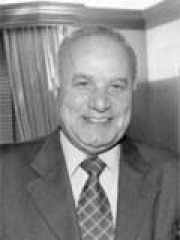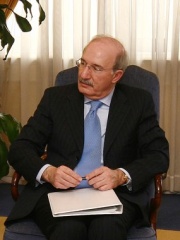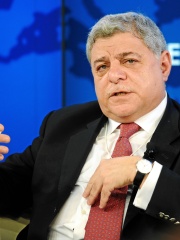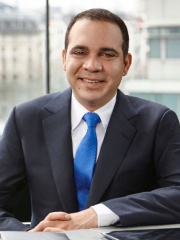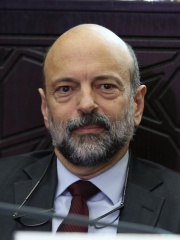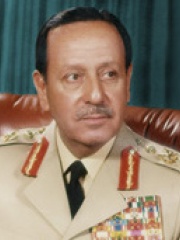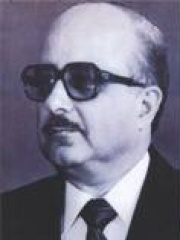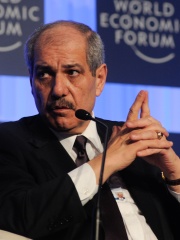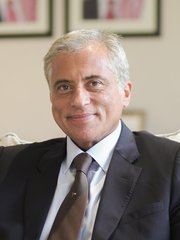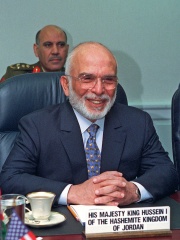
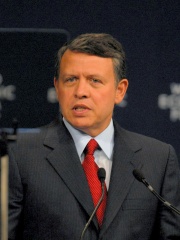
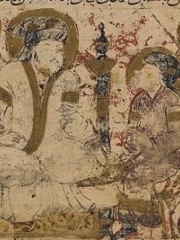
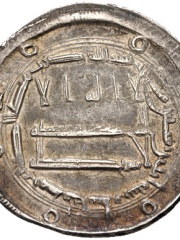

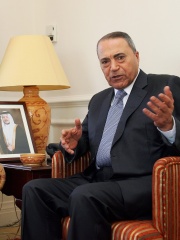
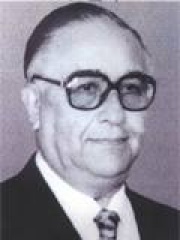
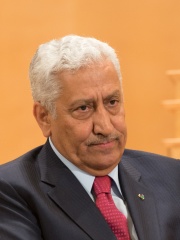
The Most Famous
POLITICIANS from Jordan
This page contains a list of the greatest Jordanian Politicians. The pantheon dataset contains 19,576 Politicians, 24 of which were born in Jordan. This makes Jordan the birth place of the 101st most number of Politicians behind Malta, and Mali.
Top 10
The following people are considered by Pantheon to be the top 10 most legendary Jordanian Politicians of all time. This list of famous Jordanian Politicians is sorted by HPI (Historical Popularity Index), a metric that aggregates information on a biography's online popularity. Visit the rankings page to view the entire list of Jordanian Politicians.

1. Hussein of Jordan (1935 - 1999)
With an HPI of 79.66, Hussein of Jordan is the most famous Jordanian Politician. His biography has been translated into 69 different languages on wikipedia.
Hussein bin Talal al-Hashimi (14 November 1935 – 7 February 1999) was King of Jordan from 1952 until his death in 1999. A member of the House of Hashim, he is regarded as a 40th-generation direct descendant of the Islamic prophet Muhammad. Hussein was born in Amman as the eldest child of Talal bin Abdullah and Zein al-Sharaf bint Jamil. Talal was at that time the heir to his own father, King Abdullah I. Hussein began his schooling in Amman, continuing his education abroad. After Talal became king in 1951, Hussein was named heir apparent. The Jordanian Parliament forced Talal to abdicate a year later due to his illness, and a regency council was appointed until Hussein came of age. He was enthroned at the age of 17 in 1953. Hussein was married four separate times and fathered eleven children. Hussein, a constitutional monarch, started his rule by allowing the formation of the only democratically elected government in Jordan's history in 1956, which he forced to resign a few months later, declaring martial law and banning political parties. Under Hussein, Jordan fought three wars with Israel, including the 1967 Six-Day War, which ended in Jordan's loss of the West Bank. In 1970, Hussein expelled Palestinian militants from Jordan in what became known as Black September. The King renounced Jordan's ties to the West Bank in 1988 after the Palestine Liberation Organization was recognized internationally as the sole representative of the Palestinians. He lifted martial law and reintroduced elections in 1989 when riots over price hikes spread in southern Jordan. In 1994 he became the second Arab head of state to sign a peace treaty with Israel. At the time of Hussein's accession in 1953, Jordan was a young nation and controlled the West Bank. The country had few natural resources, and a large Palestinian refugee population as a result of the 1948 Palestine War. Hussein led his country through four turbulent decades of the Arab–Israeli conflict and the Cold War, successfully balancing pressures from Arab nationalists, Islamists, the Soviet Union, Western countries, and Israel, transforming Jordan by the end of his 46-year reign into a stable modern state. After 1967 he engaged in efforts to solve the Israeli–Palestinian conflict. He acted as a conciliatory intermediate between various Middle Eastern rivals, and came to be seen as the region's peacemaker. He was revered for pardoning political dissidents and opponents, and giving them senior posts in the government. Hussein, who survived dozens of assassination attempts and plots to overthrow him, was the region's longest-reigning leader. He died at the age of 63 from cancer in 1999 and was succeeded by his eldest son, Abdullah II.

2. Abdullah II of Jordan (b. 1962)
With an HPI of 77.37, Abdullah II of Jordan is the 2nd most famous Jordanian Politician. His biography has been translated into 98 different languages.
Abdullah II (Abdullah bin Hussein; born 30 January 1962) is the King of Jordan, having ascended the throne on 7 February 1999. He is a member of the Hashemites, who have been the reigning royal family of Jordan since 1921, and is traditionally regarded a 41st-generation direct descendant of the prophet Muhammad. Abdullah was born in Amman, as the first child of King Hussein and his wife, Princess Muna. As the king's eldest son, Abdullah was heir apparent until Hussein transferred the title to Abdullah's uncle Prince Hassan in 1965. Abdullah began his schooling in Amman, continuing his education abroad. He began his military career in 1980 as a training officer in the Jordanian Armed Forces, later assuming command of the country's Special Forces in 1994, eventually becoming a major general in 1998. In 1993, Abdullah married Rania Al-Yassin, with whom he has four children: Crown Prince Hussein, Princess Iman, Princess Salma and Prince Hashem. A few weeks before his death in 1999, King Hussein named Abdullah his heir, and Abdullah succeeded his father. Abdullah, a constitutional monarch with wide executive and legislative powers, liberalized the economy when he assumed the throne. His reforms led to an economic boom which continued until 2008. During the following years, Jordan's economy experienced hardship as it dealt with the effects of the Great Recession and spillover from the Arab Spring. In 2011, large-scale protests demanding reform erupted in the Arab world, which led to civil wars in some countries. Abdullah responded quickly to domestic unrest by replacing the government and introducing reforms. Proportional representation was reintroduced to the Jordanian parliament for the 2016 election, a move which he said would eventually lead to establishing a parliamentary government, but government critics remained skeptical, viewing the reforms as cosmetic changes. The reforms took place amid unprecedented challenges stemming from regional instability, including an influx of 1.4 million Syrian refugees. Abdullah is known for promoting interfaith dialogue and a moderate understanding of Islam. The longest-serving current Arab leader, he is custodian of the Muslim and Christian religious sites in Jerusalem, a position held by his dynasty since 1924. The 2021 Pandora Papers revealed Abdullah's hidden wealth through offshore entities, countered by the Royal Court citing privacy and security reasons, attributing the funds to inherited wealth.

3. As-Saffah (722 - 754)
With an HPI of 73.78, As-Saffah is the 3rd most famous Jordanian Politician. His biography has been translated into 47 different languages.
Abu al-ʿAbbās Abd Allāh ibn Muḥammad ibn ʿAlī ibn ʿAbd Allāh ibn al-ʿAbbās (Arabic: أبو العباس عبد الله ابن محمد ابن علي; 721/722 – 8 June 754), known by his laqab al-Saffah (Arabic: السفّاح), was the first caliph of the Abbasid Caliphate, one of the longest and most important caliphates in Islamic history. His laqab al-Saffāḥ means "the Blood-Shedder". It may refer to his ruthless tactics, or perhaps it was used to intimidate his enemies. It was during his inaugural homage as Caliph, delivered in the Great Mosque of Kufa, that he called himself "al-Saffah" ("the Blood-Shedder"), and this title stuck to him due to his massacre of the Umayyads.

4. Al-Mahdi (744 - 785)
With an HPI of 72.61, Al-Mahdi is the 4th most famous Jordanian Politician. His biography has been translated into 44 different languages.
Abū ʿAbd Allāh Muḥammad ibn ʿAbd Allāh al-Manṣūr (Arabic: أبو عبد الله محمد بن عبد الله المنصور; 744 or 745 – 785), better known by his regnal name al-Mahdī (المهدي, "He who is guided by God"), was the third Abbasid Caliph who reigned from 775 to his death in 785. He succeeded his father, al-Mansur.
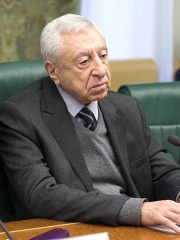
5. Nayef Hawatmeh (b. 1938)
With an HPI of 64.44, Nayef Hawatmeh is the 5th most famous Jordanian Politician. His biography has been translated into 19 different languages.
Nayef Hawatmeh (Arabic: نايف حواتمة, romanized: Nāyef Ḥawātmeh; Kunya: Abu an-Nuf; born 17 November 1938) is a Jordanian politician who is the head of the Democratic Front for the Liberation of Palestine.

6. Haya bint Hussein (b. 1974)
With an HPI of 62.71, Haya bint Hussein is the 6th most famous Jordanian Politician. Her biography has been translated into 34 different languages.
Princess Haya bint Al Hussein (Arabic: الأميرة هيا بنت الحسين; born 3 May 1974) is the daughter of King Hussein of Jordan and his third wife, Queen Alia. She is the half-sister of King Abdullah II. Haya is a graduate of the University of Oxford in England and an accomplished equestrian. She represented Jordan at the 2000 Summer Olympics in Sydney and is the two-term President of the International Federation for Equestrian Sports (FEI). In 2004, Haya became the second official wife of the ruler of the Emirate of Dubai, Sheikh Mohammed bin Rashid Al Maktoum. They had two children, Sheikha Jalila and Sheikh Zayed. In 2019, Haya and Mohammed divorced, and she left Dubai with her children to reside in the United Kingdom. Legal proceedings between Haya and Mohammed before the High Court in London over custody of their children attracted considerable media attention. On 5 March 2020, a British court ruled that on the balance of probabilities, Sheikh Mohammed, the absolute ruler of Dubai and the prime minister of the UAE, had abducted two of his daughters, Shamsa and Latifa, and had threatened Haya. In March 2022, the court awarded sole custody of the couple's two children to Haya.

7. Marouf al-Bakhit (1947 - 2023)
With an HPI of 61.05, Marouf al-Bakhit is the 7th most famous Jordanian Politician. His biography has been translated into 33 different languages.
Marouf Suleiman al-Bakhit (Arabic: معروف البخيت; 18 March 1947 – 7 October 2023) was a Jordanian politician who was twice prime minister. He first served as prime minister from 27 November 2005 until 25 November 2007 and then again from 9 February 2011 to 17 October 2011. Bakhit also held the position of Jordanian ambassador to Israel and the national security chief. Appointed prime minister by King Abdullah II less than three weeks after the 2005 Amman bombings, Bakhit's main priorities were to maintain security and stability in Jordan. He was reappointed prime minister by the King on 1 February 2011, following weeks of protests. Al-Bakhit resigned from his post on 17 October 2011, and was succeeded by Awn Al-Khasawneh on 24 October.

8. Abdelsalam Majali (1925 - 2023)
With an HPI of 57.74, Abdelsalam Majali is the 8th most famous Jordanian Politician. His biography has been translated into 21 different languages.
Abdelsalam Atalla al-Majali ( AHB-dəl sə-LAM al mə-JAH-lee; Arabic: عبد السلام المجالي; 18 February 1925 – 3 January 2023) was a Jordanian physician and politician who served twice as Prime Minister of Jordan.

9. Abdullah Ensour (b. 1939)
With an HPI of 57.74, Abdullah Ensour is the 9th most famous Jordanian Politician. His biography has been translated into 24 different languages.
Abdullah Ensour ( AHB-də-lə en-SOOR; Arabic: عبد الله النسور ʿAbd Allāh an-Nasūr; born 20 January 1939) is a Jordanian economist who served as the 40th prime minister of Jordan between October 2012 and May 2016. A veteran politician, he has held various cabinet positions in Jordanian government in addition to being prime minister.
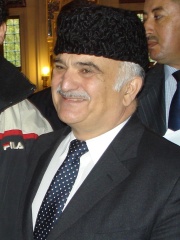
10. Prince Hassan bin Talal (b. 1947)
With an HPI of 57.73, Prince Hassan bin Talal is the 10th most famous Jordanian Politician. His biography has been translated into 17 different languages.
Prince Hassan bin Talal (Arabic: الحسن بن طلال, born 20 March 1947) is a member of the Jordanian royal family who was previously Crown Prince from 1965 to 1999, being removed just three weeks before King Hussein's death. He is now 20th in line to succeed his nephew King Abdullah II.
People
Pantheon has 24 people classified as Jordanian politicians born between 722 and 1988. Of these 24, 15 (62.50%) of them are still alive today. The most famous living Jordanian politicians include Abdullah II of Jordan, Nayef Hawatmeh, and Haya bint Hussein. The most famous deceased Jordanian politicians include Hussein of Jordan, As-Saffah, and Al-Mahdi. As of April 2024, 1 new Jordanian politicians have been added to Pantheon including Jafar Hassan.
Living Jordanian Politicians
Go to all RankingsAbdullah II of Jordan
1962 - Present
HPI: 77.37
Nayef Hawatmeh
1938 - Present
HPI: 64.44
Haya bint Hussein
1974 - Present
HPI: 62.71
Abdullah Ensour
1939 - Present
HPI: 57.74
Prince Hassan bin Talal
1947 - Present
HPI: 57.73
Adnan Badran
1935 - Present
HPI: 54.72
Zeid Raad Al Hussein
1964 - Present
HPI: 54.36
Nader Al-Dahabi
1946 - Present
HPI: 54.28
Awn Al-Khasawneh
1950 - Present
HPI: 53.86
Hani Mulki
1951 - Present
HPI: 53.53
Prince Ali bin Hussein
1975 - Present
HPI: 53.51
Omar Razzaz
1961 - Present
HPI: 53.28
Deceased Jordanian Politicians
Go to all RankingsHussein of Jordan
1935 - 1999
HPI: 79.66
As-Saffah
722 - 754
HPI: 73.78
Al-Mahdi
744 - 785
HPI: 72.61
Marouf al-Bakhit
1947 - 2023
HPI: 61.05
Abdelsalam Majali
1925 - 2023
HPI: 57.74
Zaid ibn Shaker
1934 - 2002
HPI: 57.26
Mudar Badran
1934 - 2023
HPI: 55.20
Fayez Tarawneh
1949 - 2021
HPI: 53.10
Muath Al-Kasasbeh
1988 - 2015
HPI: 49.58
Newly Added Jordanian Politicians (2025)
Go to all RankingsOverlapping Lives
Which Politicians were alive at the same time? This visualization shows the lifespans of the 5 most globally memorable Politicians since 1700.

